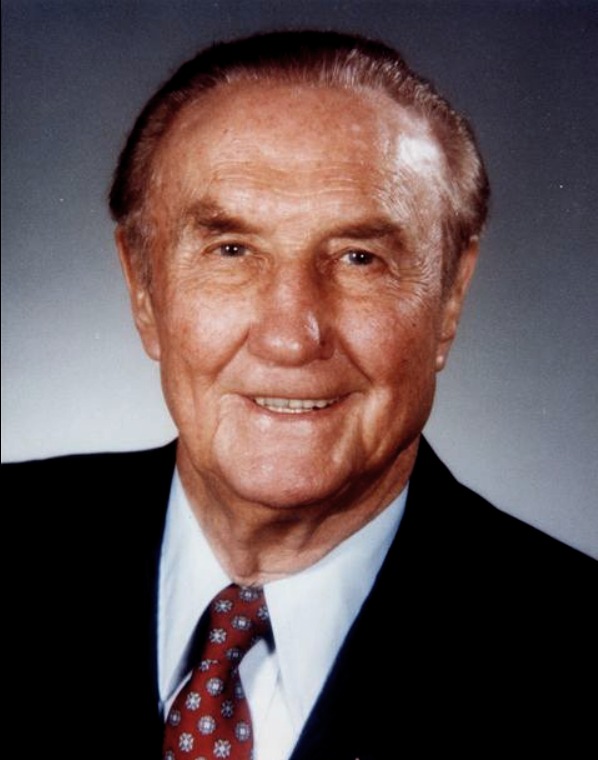Strom Thurmond and Adoption
Biography
1902 - 2003
Politician
James Strom Thurmond was born on December 5, 1902 in Edgefield, South Carolina, the son of John William and Eleanor Gertrude (Strom) Thurmond. Educated in the Edgefield County public schools, he graduated from Clemson College (now Clemson University) in 1923 with a degree in horticulture. He was a farmer, teacher and athletic coach until 1929, when he became the Edgefield County superintendent of education, serving in this position until 1933. He read law with his father and was admitted to the South Carolina Bar in 1930. He served as the Edgefield Town and County attorney from 1930-1938.
In 1933 Thurmond was elected to the South Carolina Senate and represented Edgefield until he was elected to the Eleventh Circuit judgeship. When the United States entered World War II he left the judgeship temporarily to serve in the U.S. Army. Thurmond was with the Civil Affairs section of the First Army headquarters and participated in the Normandy invasion on assignment with the 82nd Airborne Division. After Germany surrendered in May 1945 he briefly served in the Pacific before returning to South Carolina. In 1946 Thurmond ran successfully for governor of South Carolina.
He was governor from 1947 to 1951. He married Jean Crouch (1926-1960), daughter of Horace J. and Inez Breazeale Crouch of Elko, South Carolina in 1947; they had no children. Objecting to the 1948 nomination of Harry S Truman for President by the National Democratic Party, Thurmond ran as the presidential candidate of the States Rights' Democratic Party and won four southern states (Alabama, Louisiana, Mississippi and South Carolina) and thirty-nine electoral votes. He ran unsuccessfully against Olin D. Johnston for U.S. Senator in 1950. Thurmond was the Chairman of Southern Governor's Conference in 1950.
After leaving the governorship Thurmond resumed his law practice. He became president of the Reserve Officers Association in 1954 and served until 1955; he would later retire as a Major General, U.S. Army Reserves. Upon the death of U.S. Senator Burnet Rhett Maybank in 1954, Thurmond ran as a write-in candidate for Senator against the nominee of the South Carolina Democratic Party, Edgar Brown. He defeated Brown in the primary, becoming the first person in U.S. history to be elected to a major office by write-in ballot. Thurmond resigned from the Senate in 1956 in fulfillment of a campaign promise and was re-elected to the Senate that same year.
As Senator, Thurmond served on a number of important committees, including Armed Services, Judiciary and Veterans Affairs. He was President Pro Tempore from 1981-1987, and served as chairman of the Judiciary Committee during the same period; he became President Pro Tempore again in 1995 and that same year became chairman of the Armed Services Committee. He was the originator of the 1956 "Southern Manifesto" against the 1954 Supreme Court desegregation ruling. Thurmond holds the record for the longest filibuster in Senate history; he spoke against the 1957 civil rights bill for twenty-four hours, eighteen minutes. He switched from the Democratic to the Republican Party in 1964 and aided Barry Goldwater in his unsuccessful bid for the Presidency against Lyndon Johnson. Thurmond was instrumental in the "southern strategy" that won the White House for Richard M. Nixon in 1968. Thurmond is the author of The Faith We Have Not Kept (1968).
He married Nancy Janice Moore (1946- ), daughter of Paul Robinson and Julie Moore of Aiken, South Carolina on December 22, 1968. They had four children: Nancy Moore (1971-1993), James Strom II (1972- ), Juliana "Julie" Gertrude (1974- ) and Paul Reynolds (1976- ). Thurmond's first and oldest child, Essie Mae Washington-Williams (1925- ), was the daughter of Carrie Butler (1909-1947) who worked as a maid in the Thurmond family home in Edgefield, SC. Butler's aunt and uncle, Mr. & Mrs. Washington, adopted Essie Mae and took her to live with them in Pennsylvania when she was six months old.
Senator Thurmond received the USO's "Spirit of Hope" award September 23, 1998 on Capitol Hill. The award, named for comedian Bob Hope, goes to Americans whose patriotism and service to U.S. troops reflects that of Hope. Following a lifetime of achievements, Thurmond brought his Senate career to a close in January 2003. His record stands as the longest serving and oldest Senator in US history with 48 years at age 100. He died on June 26, 2003, and was buried at the Edgefield Cemetery. Thurmond was the longest-serving senator in U.S. history.
References
Credits: The Strom Thurmond Institute of Government & Public Affairs
